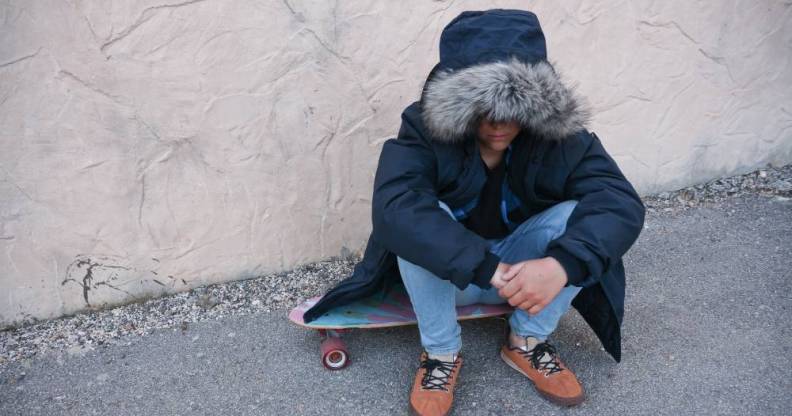One in six homeless LGBT+ youth have been sexually abused by family members, damning report finds

(Envato Elements)
LGBT+ youth are being forced into homelessness after sexual abuse from family members, a shocking report confirms, with many having casual sex to keep a roof over their head while homeless.
Almost a fifth (17 per cent) of LGBT+ young people surveyed by LGBT+ youth homelessness charity akt said they felt like they had to have casual sex to find somewhere to stay while they were homeless. A similar number (16 per cent) said they engaged in sex work as a direct result of being made homeless.
The charity asked 161 LGBTQ+ young people about their experiences of homelessness in the last five years in the UK. Almost a quarter (24 per cent) said they experienced being homeless for one to three months, while 21 per cent experienced up to six months of being homeless. Almost three per cent said they had been homeless for over three years.
The damning report found that many LGBT+ young people experienced sexual abuse before being made homeless. One in six (16 per cent) said they were forced by family members to do sexual acts before they became homeless. The same number said they experienced this with a romantic partner.
Sadly, the akt report found abuse was prevalent in other areas. Two-thirds (66 per cent) of LGBT+ young homeless people said they were repeatedly belittled by family members to the point they felt worthless, and a similar number (61 per cent) said they felt frightened or threatened by their family before they became homeless.
Half (50 per cent) said, before they were homeless, they feared expressing their LGBT+ identity to their family would result in them being evicted.
Tim Sigsworth, chief executive of akt, and Terry Stacy, chair, said in a joint statement that the tragic report provided evidence for rethinking how organisations and the UK government support young LGBT+ people at risk of homelessness.
The charity called for the government to introduce “mandatory monitoring of gender and sexuality as a first vital step across housing and homelessness services” which it said would lead to “faster and more responsive interventions”.
akt said there also needed to be a “stronger emphasis on prevention focused intervention” to limit the long-term impacts of homelessness including “poor mental health and perpetual journeys of abuse”.
Rick Henderson, CEO of Homeless Link, said the akt research shows the “abuse many LGBTQ+ young people experience in their family home”. He said the experience of homelessness is “isolating and can inhibit young people’s opportunities to build relationships and communities with their peers”.
“This report shines a light on the experiences of abuse, discrimination and suffering faced by young people who are marginalised due to their sexuality or gender identity,” Henderson said.
“While there is extensive research about how early experiences of adversity impact on health and social welfare, this research provides an explicit picture of how these experiences lead to and sustain young LGBTQ+ people’s homelessness and risk of further abuse and exploitation.”
Unfortunately, the majority (92 per cent) of young LGBT+ people surveyed by akt said that being homeless harmed their mental health. Almost three in five (58 per cent) said it had negatively impacted their physical health.
Three in 10 (29 per cent) said they started drinking as a way to cope with being made homeless, and 22 per cent admitted to taking drugs for the first time because of being homeless.
Almost one quarter (24 per cent) said they weren’t aware of any housing support services available to them, compared to 44 per cent who said they were aware.

